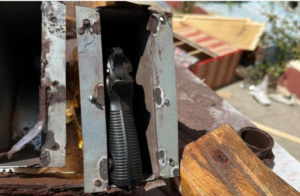The Palestinian smuggling of weaponry is apparently an uncomfortable subject for leading news agency Associated Press. Like thieves in the night ferrying illegal contraband, AP journalists conceal, distract and deflect to keep inconvenient truths away from sunlight.
Last May, when terrorists in the Gaza Strip attempted to smuggle firearms, silencers and ammunition into the West Bank by concealing them in a furniture shipment, the Associated Press failed to cover the story.
Again in recent days, AP coverage at first ignored and then later downplayed or otherwise misrepresented Palestinian smuggling.

Explosives found September 2023 in a clothing shipment exiting the Gaza Strip for the West Bank (Photo courtesy of Israel’s Ministry of Defense)
In Sunday’s article (Sept. 10), “Families in Gaza have waited years to move into new homes,” the Associated Press blamed Israeli measures to block Hamas’ smuggling of weapons — and not Hamas’ smuggling arms — as fueling multiple rounds of violence. Issam Adwan reported:
Israel considers Hamas a terrorist group and immediately imposed a blockade with Egypt in what it says is a measure to prevent Hamas from arming. The closure has devastated Gaza’s economy and helped fuel four wars and numerous smaller rounds of violence. Repeated reconciliation attempts by Hamas and the PA have failed. (Emphases added.)
Not only did AP’s Adwan state as fact the questionable claim that Israeli measures imposed to prevent the smuggling of weapons meant for violent attacks themselves fuel violence. He also used qualifying language (“what [Israel] says”) to cast doubt on the purpose of the Israeli-Egyptian blockade. Readers could reasonably conclude from this formulation that Hamas’ arming is not a genuine concern. Perhaps, the uninformed could surmise, Hamas is undertaking no such effort to arm itself.
The AP, a news agency which ostensibly operates under the slogan of “advancing the power of facts,” does not freely advance the facts regarding Hamas’ efforts to arm itself in Gaza as well as in the West Bank.
Indeed, for three full days after Israeli authorities announced that the thwarting of explosives smuggling from the Gaza Strip meant for the West Bank, AP completely ignored the story, despite its stated commitment to supplying “news and services that expand the reach of factual reporting.”
Times of Israel, but not the Associated Press, reported Sept. 4 (“Israel says it foiled attempt to smuggle explosives from Gaza to West Bank“):
Israeli authorities on Monday foiled an attempt by Palestinians to smuggle several kilograms of explosive material from the Gaza Strip to terror operatives in the West Bank, the Defense Ministry said.
According to the ministry, security guards at the Kerem Shalom Crossing found the “high-quality” explosive material hidden in a shipment of clothes being exported from the Gaza Strip to Israel.
It said that, according to initial assessments, the explosives were intended to be used for terror activity in the West Bank.
Israeli authorities on Monday foiled an attempt by Palestinians to smuggle several kilograms of explosive material from the Gaza Strip to terror operatives in the West Bank, the Defense Ministry said.
According to the ministry, security guards at the Kerem Shalom Crossing found the “high-quality” explosive material hidden in a shipment of clothes being exported from the Gaza Strip to Israel.
It said that, according to initial assessments, the explosives were intended to be used for terror activity in the West Bank.
The explosives and three trucks worth of “international fashion brand clothes” were seized and the investigation was handed over to the Shin Bet security agency, the ministry said.Following the incident, IDF Chief of Staff Lt. Gen. Herzi Halevi instructed the ministry to halt all exports of goods from the Gaza Strip until further notice. The move was approved by Defense Minister Yoav Gallant.
The ministry said it would reopen the checkpoint for exports following an assessment.
Only on Sept. 7 did AP finally share the information about the attempted weapons smuggling, but even then just as a side note to what it saw as the bigger story: “Gaza fishermen decry Israel’s ban on Gaza exports collective punishment.”

Weapons uncovered in a furniture shipment exiting the Gaza Strip for the West Bank, May 2023 (Photo by Israel’s Ministry of Defense)
Indeed, AP’s Issam Adwan and Isabel Debre devote more than four and half times space to Palestinian complaints about the impact of the halt to exports than to the reason for the suspension of exports.
Reporting the lengthy Palestinian grievances about Israel’s response to exploitation of exports for the purpose of smuggling, AP quotes Muhammad al-Ghussein, a spokesperson for the Palestinian Business Assocation, who repeats previously debunked claims about the blockade’s “devastating” impact on Gaza’s fishing industry: “Halting exports is like dealing a fatal blow to a sector that’s already dying.”
In fact, as a CAMERA-prompted New York Times correction stated:
An article last Sunday about the struggles of Gaza’s fishing sector omitted important context surrounding the impact of Israel’s blockade on the industry, leaving the impression that the industry had been devastated. While the blockade has led to a shortage of parts needed to keep some fishing boats operational, the annual catch has varied from year to year. The current catch is higher than that in the early years of blockade.
Thus, like smugglers covering their crimes with diversions, AP devotes extensive space to false claims about Gaza’s “dying” fishing sector due to Israeli measures to prevent weapons smuggling. Meanwhile, the real story — the mass smuggling of weapons which fuels violence and drives up among deaths among Israelis and Palestinians alike — slips by largely unnoticed.
As Ehud Yaari recently wrote for the Washington Institute for Near East Policy:
The deteriorating security situation reflects a change in modus operandi by Hamas and other groups. They have largely (though not completely) abandoned their previous approach in the West Bank, which focused on establishing disciplined underground networks with chains of command and communication channels in order to set specific targets and timing for action. Apparently, they concluded that Israeli authorities found it easier to penetrate and dismantle such networks. Instead of trying to control operations from Gaza and Beirut—the main headquarters of the Hamas “West Bank Committees”—the policy now is to flood the area with weapons and funds, enabling local (not necessarily affiliated) groups to arm themselves and select targets.
Insofar as journalists ignore, whitewash or deflect from Palestinian weapons smuggling, they keep a hugely influential factor contributing to increasingly deadly West Bank violence in the shadows.
See also “BBC Sidelining Of A Crucial Aspect of Stories It Regularly Reports“
